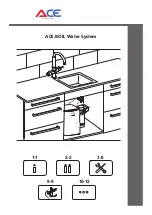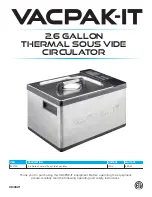
6
INSTALLATION INSTRUCTIONS
REQUIRED ABILITY
INSTALLATION OR SERVICE OF THIS WATER HEATER
REQUIRES ABILITY EQUIVALENT TO THAT OF A LICENSED
TRADESMAN IN THE FIELD INVOLVED. PLUMBING, AIR SUPPLY,
VENTING, GAS SUPPLY AND ELECTRICAL WORK ARE REQUIRED.
WARNING
FAILURE TO FOLLOW THESE INSTRUCTIONS CAN RESULT
IN SERIOUS PERSONAL INJURY OR DEATH.
UNCRATING
The heater is shipped with the inducer already installed. The wiring
conduit runs from the thermostat to the inducer. Before turning unit on,
check to make sure wiring conduit is securely plugged into the inducer.
LOCATING THE HEATER
WARNING
THERE IS A RISK IN USING FUEL BURNING APPLIANCES SUCH
AS GAS WATER HEATERS IN ROOMS, GARAGES OR OTHER
AREAS WHERE GASOLINE, OTHER FLAMMABLE LIQUIDS OR
ENGINE DRIVEN EQUIPMENT OR VEHICLES ARE STORED,
OPERATED OR REPAIRED. FLAMMABLE VAPORS ARE HEAVY
AND TRAVEL ALONG THE FLOOR AND MAY BE IGNITED BY THE
HEATER’S PILOT OR MAIN BURNER FLAMES CAUSING FIRE
OR EXPLOSION. SOME LOCAL CODES PERMIT OPERATION OF
GAS APPLIANCES IN SUCH AREAS IF THEY ARE INSTALLED
18” OR MORE ABOVE THE FLOOR. THIS MAY REDUCE THE
RISK IF LOCATION IN SUCH AN AREA CANNOT BE AVOIDED.
DO NOT INSTALL THIS WATER HEATER DIRECTLY ON A
CARPETED FLOOR. A FIRE HAZARD MAY RESULT.
Instead the
water heater must be placed on a metal or wood panel extending
beyond the full width and depth by at least 3 inches in any direction.
If the heater is installed in a carpeted alcove, the entire floor shall
be covered by the panel. Also, see the DRAINING requirements
in MAINTENANCE Section.
THE HEATER SHALL BE LOCATED OR PROTECTED SO IT IS
NOT SUBJECT TO PHYSICAL DAMAGE BY A MOVING VEHICLE.
WARNING
FLAMMABLE ITEMS, PRESSURIZED CONTAINERS OR ANY
OTHER POTENTIAL FIRE HAZARDOUS ARTICLES MUST
NEVER BE PLACED ON OR ADJACENT TO THE HEATER. OPEN
CONTAINERS OR FLAMMABLE MATERIAL SHOULD NOT BE
STORED OR USED IN THE SAME ROOM WITH THE HEATER.
When installing the heater, consideration must be given to
proper location. Location selected should be as close to the
stack or chimney as practicable, with adequate air supply and as
centralized with the piping system as possible.
THE HEATER MUST NOT BE LOCATED IN AN AREA WHERE
IT WILL BE SUBJECT TO FREEZING.
LOCATE IT NEAR A FLOOR DRAIN. THE HEATER SHOULD BE
LOCATED IN AN AREA WHERE LEAKAGE FROM THE HEATER
OR CONNECTIONS WILL NOT RESULT IN DAMAGE TO THE
ADJACENT AREA OR TO LOWER FLOORS OF THE STRUCTURE.
WHEN SUCH LOCATIONS CANNOT BE AVOIDED, A SUITABLE
DRAIN PAN SHOULD BE INSTALLED UNDER THE HEATER.
Such
pans should be fabricated with sides at least 2” deep, with length and
width at least 2” greater than the diameter of the heater and must be
piped to an adequate drain. The pan must not restrict combustion air flow.
For appliance installation locations with elevations above
2000 feet (610m), refer to HIGH ALTITUDE INSTALLATIONS
section of this manual for input reduction procedure.
LEVELING
If the unit is not level, insert the bolts which were used in crating
into the legs to correct this condition.
CLEARANCES
These heaters are approved for installation on combustible flooring
in an alcove when the minimum clearance from any combustion
construction are followed as indicated in figure 6.
In all installations the minimum combustible clearances from vent
piping shall be 6”. Vent piping passing through a combustible wall
or ceiling must be a continuous run (no joints) and retain the 6”
clearance unless an approved reducing thimble is used.
A service clearance of 24” should be maintained from serviceable
parts, such as relief valves, flue baffles, thermostats, cleanout
openings or drain valves.
The units are approved for installation with side, rear and ceiling
clearances.
HARD WATER
Where hard water conditions exist, water softening or threshold type
of water treatment is recommended. This will protect dishwashers,
coffee urns, water heaters, water piping and other equipment.
See MAINTENANCE section for details of tank cleanout procedure.
CLOSED WATER SYSTEMS
Water supply systems may, because of code requirements
or such conditions as high line pressure, among others, have
installed devices such as pressure reducing valves, check
valves, and back flow preventers. Devices such as these cause
the water system to be a closed system.
THERMAL EXPANSION
As water is heated, it expands (thermal expansion). In a closed
system the volume of water will grow when it is heated. As the
volume of water grows there will be a corresponding increase
in water pressure due to thermal expansion. Thermal expansion
can cause premature tank failure (leakage). This type of failure
is not covered under the limited warranty. Thermal expansion
can also cause intermittent Temperature-Pressure Relief Valve
operation: water discharged from the valve due to excessive
pressure build up. This condition is not covered under the limited
warranty. The Temperature-Pressure Relief Valve is not intended
for the constant relief of thermal expansion.
A properly sized thermal expansion tank must be installed on
all closed systems to control the harmful effects of thermal
expansion. Contact a local plumbing service agency to have a
thermal expansion tank installed.
AIR REQUIREMENTS
REFER TO THE LATEST EDITION OF THE “NATIONAL FUEL
GAS CODE” ANSI Z223.1/NFPA 54.
KEEP APPLIANCE AREA CLEAR AND FREE OF COMBUSTIBLE
MATERIALS, GASOLINE AND OTHER FLAMMABLES,
VAPORS AND LIQUIDS.
DO NOT OBSTRUCT THE FLOW OF COMBUSTION OR
VENTILATING AIR.
WARNING
FOR SAFE OPERATION PROVIDE ADEQUATE AIR FOR
COMBUSTION AND VENTILATION. AN INSUFFICIENT SUPPLY
OF AIR WILL CAUSE RECIRCULATION OF COMBUSTION
PRODUCTS RESULTING IN AIR CONTAMINATION THAT
MAY BE HAZARDOUS TO LIFE. SUCH A CONDITION OFTEN
WILL RESULT IN A YELLOW, LUMINOUS BURNER FLAME,







































